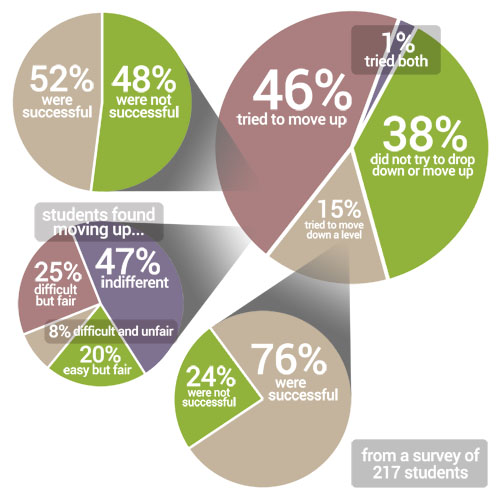With first quarter just ending, modifying schedules becomes increasingly difficult due to timeliness. As fellow students, the Oracle Editorial Board recognizes the challenging process of moving up or down a class level. However, upon further investigation, we would like to remind students that the process does not aim to discourage nor upset students, but rather it appropriately analyzes the students’ ability.
When it comes to moving up a class level, we support departments’ decisions. When it comes to moving down a class level, though, we’d like to stress the importance of students’ input since they can most appropriately measure their need to drop down.
MOVING TO A HIGHER-LEVEL CLASS:
The processes of moving to a higher-level class for all departments generally start the same way: students initiate conversation with their teachers, requesting to be placed into a higher-level course. Next, a conversation typically takes place between the teacher, instructional supervisor and/or guardians and counselors.
After these conversations, every department has different criteria for students looking to move up a class level. The Math and Science Departments will usually look for competent grades while the English, Foreign Language and Social Studies Departments will look for the student’s quality of work through a combination of grades, test scores and writing pieces. Sounds fair, right?
Through an Oracle-conducted survey of 217 students, 46 percent of students tried to move up a class level, with 8 percent of those students finding the process to be difficult and unfair.
One of these students includes sophomore Alex Brown, who tried to move up to an honors class from a regular class but was unable to.
“If you didn’t know what a teacher wanted at the beginning of the year, or a traumatic event happens and you miss one test, then you can never move to honors,” Brown said.
While the Editorial Board first agreed with these students, we found the processes to be reasonable evaluations of students’ potential ability.
“We’re looking for the potential of a student to be able to thrive in the course,” Susan Levine-Kelley, instructional supervisor of the English Department, said. “I tell every student who comes in here, this process is not there to keep students out.”
Even if the process to move up a class level requires numerous, daunting steps, we’d like to remind students that departments are seeking to benefit the needs and capabilities of students, and that often these evaluations are in the student’s best interests.
Another factor that may contribute to a student’s dislike of the level-change process is timing.
Students looking to switch in the middle of the school year may run into difficulties due to set class sizes, even if they are qualified to move up a level. The number of students in a classroom can only fluctuate so much. Also, the timing of course material taught can be sensitive for different classes, resulting in a rough transition.
We consider ourselves as advocates of the process of moving up a class level; however, if a student should feel discouraged for any reason, we encourage them to talk with instructional supervisors beyond talking with their own teachers. We also encourage starting the conversation early. There is no harm in letting a teacher or department head know about intentions on moving up a class level in the future. The process exists to benefit students; work with it.
MOVING TO A LOWER-LEVEL CLASS:
The process for moving down a class level also begins with a conversation with a teacher or counselor. Though we believe that the process for moving up should be heavily dependent on departmental consensus, the decision for moving down a level should ultimately be up to the student.
While researching the processes of moving down a class level for each department, the Editorial Board found that many departments would rather keep a student in the higher level to provide the appropriate amount of challenge. The key word is “appropriate.” For many students who want to move down, the higher-level class is too difficult for them, they may have an unstable amount of higher-level classes, or they cannot handle the workload.
As students, we are aware of the amount of stress and work a class provides. For some, the challenge is healthy, but for others it’s overwhelming and causes more anxiety than one should feel about a class.
We agree that students should be challenged; however, when it comes to a student’s stress level and workload, the student should be the one to make the call on dropping down. A student’s grade may be high and reflect good work ethic and comprehension of content, but if he or she feels that they should be placed in a lower-level class, the student’s opinion should be in the vanguard of the decision.
Students who feel that dropping a class level would be appropriate should start the conversation early with teachers, counselors or instructional supervisors. If these departmental members are unsuccessful in convincing students to stay at the current class level, an effective resort would be a guardian who could attest to the class’ overwhelming challenge or workload.
The department wants what’s most appropriate and beneficial for a student, and if a student strongly asserts that a class is negatively pushing their limits, the department should abide by the student’s requests and help them succeed at a more academically suitable level.










